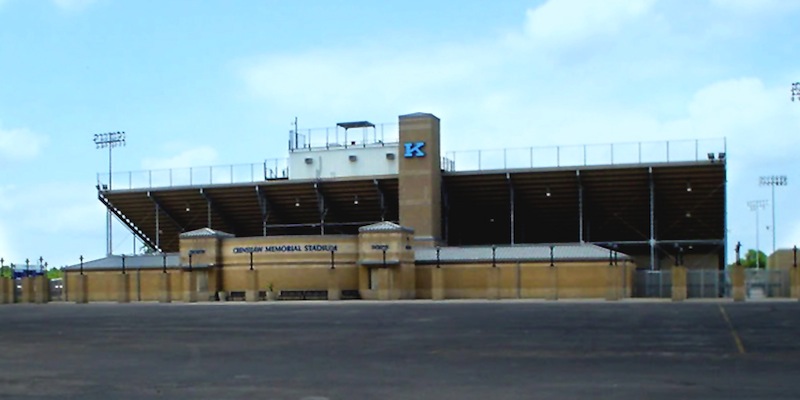It took a true shot in the dark, but I discovered a
long-lost gem of a broadcast last night, hearkening back to the Friday-night lights of my past.
I’ve spent a lot of time this month sending out feelers about
broadcasting jobs in college sports for 2012-13. I have not, however, gotten a
lot of responses. But I continue to work on my online demo
page to try and impress potential employers.
My demo page had clips from a number of different sports,
but there was no football. That’s a gaping hole when I want to be considered
for college football broadcasts this year. I know football and do have experience
calling it, but the only recordings I had were from my first year calling high
school games, back in 2006, and they had a pretty significant hum from
internet-only recordings.
I knew the best football game I’ve called came on a
random Friday night in 2008, during my first year working for the Dynamo, when
I was called to fill in on the game of the week for Houston’s ESPN affiliate at
the time, 97.5 FM. I had always felt like that broadcast gave a much stronger
representation of my football skills. Unfortunately, I hadn’t been able to get
a recording of the game at the time and just assumed it didn’t exist.
So late last night, unable to sleep with a heightened sense
of urgency to improve my demo page with some football, I went back and listened
to a couple of those old games from 2006. I really didn’t feel good about sharing
those as examples of my “best work,” so I dug a little deeper. The
Texas Sports Radio Network had given me my first chances to
broadcast high school football, and TSRN archives its games. I figured there
was no way anything went that far back, especially because the ‘archive’ button
on the website only took me to Houston high-school broadcasts from 2011-12.
This is where I got lucky. Because “/2011-12/” was
included as part of the URL, I surmised that other years, though not linked
anywhere on the site, might be available. So I replaced the 2011-12 with 2008-09, clicked ‘Football,’ and was presented with a list of games from 2008. I still worried
that my broadcast, having been on real radio rather than simply an internet
broadcast, would not be listed, but it was there!
Since each game had a link, presumably to a stream of the
broadcast, I thought I had solved the problem. But the detective work wasn’t
done. Clicking on the link brought me to an error page telling me the file did
not exist. That stumped me for a bit, but I noted the URL that was not coming
up and went back to compare it against the URLs from more recent archives that
were still available. There were obvious differences, so I substituted the
correct years and filename in the file path. After trying several different
variations without success – I was getting tired of being told the file did not
exist – I finally got a response, and an audio file started loading!
The file covered about eight hours, but luckily the main
focus of it was a three-hour broadcast of the game between Dayton and C.E.
King, with me on the play-by-play. What a relief! Listening to the game brought back some great memories of a crazy night at Crenshaw Memorial Stadium (pictured above) on the technical side and an impressive night on the football side. The game included Dayton quarterback
Cody Green, who might be the starter at Tulsa this fall, and current UH hurdler
Cameron LaCour, the brother of Nebraska track star
Karyn LaCour, whom I profiled when I worked in Humble.
The trip down memory lane means I finally have some football
clips I can send to potential employers to show them I can handle it, even if
it is from four years ago.The
full game is still available (be patient and
allow the audio file to load, then drag ahead to the game action), and here’s
the
14-minute clip on my demo page.
Some late-night industry and a little bit of luck, and
maybe somebody will take a chance on me calling football games after all!


